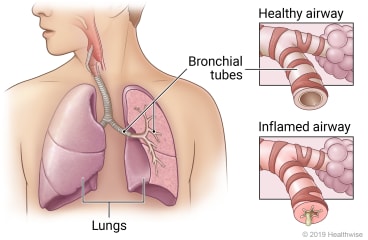
What is COPD?
COPD is a lung disease that makes it hard to breathe. COPD stands for chronic obstructive pulmonary disease. It is caused by damage to the lungs over many years, usually from smoking.
Air pollution also causes COPD. Other things that may lead to COPD include breathing chemical fumes, factory dust, soot, or secondhand smoke over a long period of time.
Chronic bronchitis and emphysema are two lung problems that are types of COPD. In chronic bronchitis, the airways that carry air to the lungs (bronchial tubes) get inflamed and make a lot of mucus. This can narrow or block the airways, making it hard for you to breathe. It can also make you cough. In emphysema, the air sacs in your lungs are damaged and lose their stretch. Less air gets in and out of your lungs, which makes you feel short of breath.
What happens when you have COPD?
COPD often gets worse over time. Over time, you may feel short of breath from simple activities. Some people get other health problems. You may be able to help slow the progress and prevent problems. Your treatment plan and taking care of yourself can help you feel better and may help you live longer.
What are the symptoms?
The main symptoms are:
- A cough that will not go away.
- Mucus that comes up when you cough.
- Shortness of breath that gets worse with activity.
Sometimes your symptoms may get worse over a short time and stay bad. This is called a COPD exacerbation (say "ig-ZAS-ur-BAY-shun") or flare-up. A flare-up can be dangerous, so it's important to know what to do and take action. Your doctor can help you make a plan to manage flare-ups.
Symptoms of a flare-up include:
- More shortness of breath than usual.
- Coughing more than usual.
- A change in the amount, color, or thickness of mucus.
How can you care for yourself?
If you smoke, try to quit or cut back as much as you can. Talk to your doctor if you need help quitting. Learn to use your inhalers correctly. This will help the medicines work better. Try to avoid things that make your symptoms worse. And stay up to date on vaccines.
How is COPD treated?
Treatment for COPD can help you feel better and prevent flare-ups. Some treatments may also slow the disease and help you live longer.
- Medicines called bronchodilators are used to open or relax your airways. They can help you breathe easier and prevent breathing problems.
- Other medicines may be used to help you feel better and prevent or treat flare-ups.
- Oxygen therapy boosts the amount of oxygen in your blood and helps you breathe easier.
- Self-care means things you can do for yourself to help manage COPD. These are things like:
- Trying to quit smoking or cutting back as much as you can.
- Asking your doctor, pharmacist, or respiratory therapist how to use each of your inhalers correctly.
- Eating healthy.
- Staying active.
- Avoiding colds, infections, and other things that may trigger your symptoms.
- Staying current on vaccines.
- Pulmonary rehabilitation (rehab) can give you education and support that help you stay as healthy as possible.
- You may choose palliative care to help relieve your shortness of breath and improve your quality of life.
- You can plan ahead for what kind of care you want if you become very ill. This is called advance care planning.
- Surgery or certain procedures may be an option for some people.
Follow-up care is a key part of your treatment and safety. Be sure to make and go to all appointments, and call your doctor if you are having problems. It's also a good idea to know your test results and keep a list of the medicines you take.
Where can you learn more?
Go to http://www.healthwise.net/patientEd
Enter V314 in the search box to learn more about "Learning About COPD".
Current as of: September 29, 2025
Author: Ignite Healthwise, LLC Staff
Clinical Review Board
All Ignite Healthwise, LLC education is reviewed by a team that includes physicians, nurses, advanced practitioners, registered dieticians, and other healthcare professionals.

